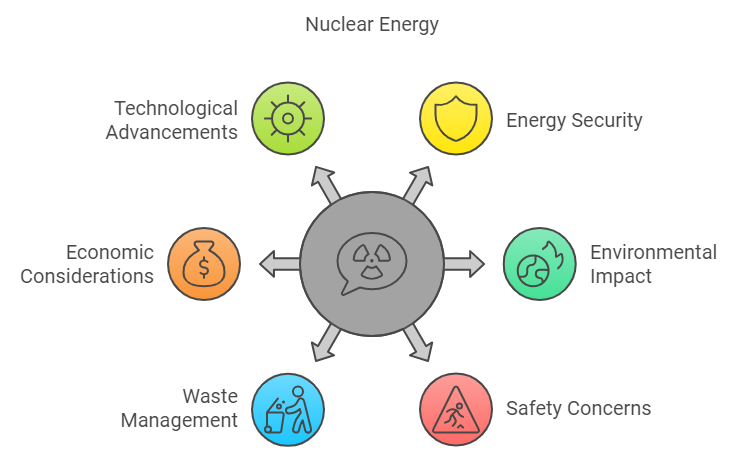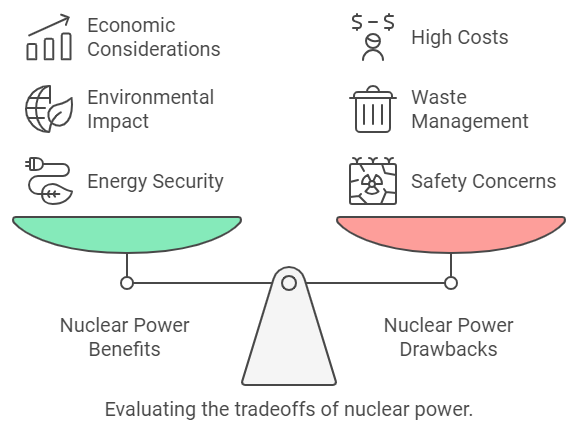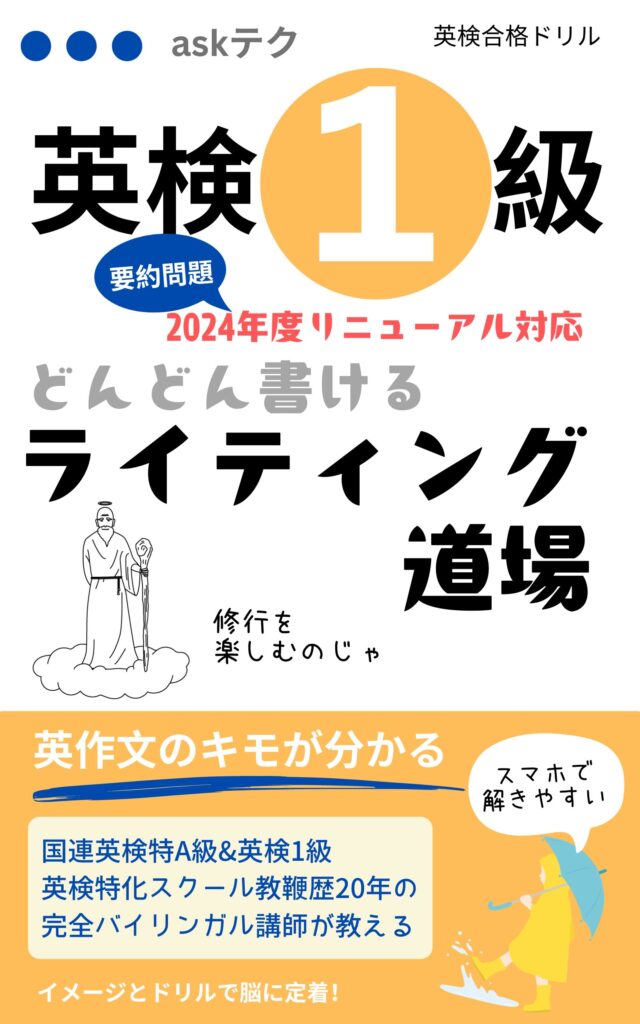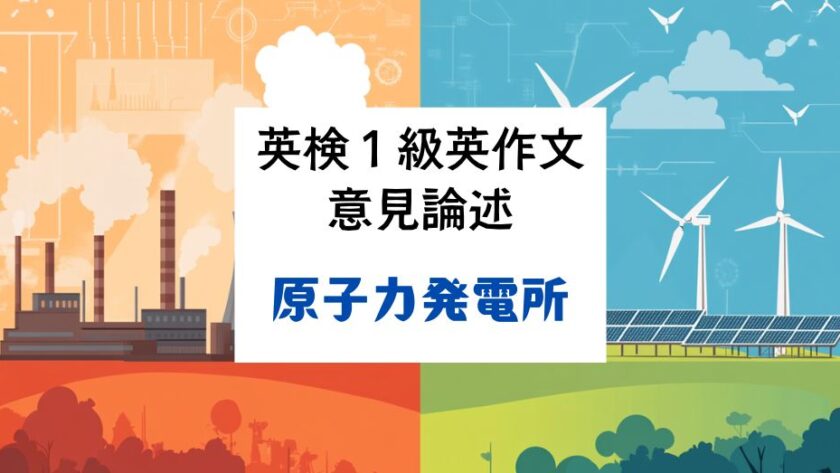(簡単★~難しい★★★★★)語彙難易度★★★

目次
Question: Should nuclear power plants be banned?
原子力発電所は禁止されるべきでしょうか?
トレーニング手順
200~240語程度、3つの観点、目標解答時間:約25分
- 分野・トピック毎の観点とキーワードをまとめる
以下の画像のようなイメージ図にしておくと、記憶に定着するのでおススメ - 自分が書きやすい立場・観点で実際に書く
分からない表現はすぐに調べて15分程度で書く - 続いて、先ほどとは反対意見で書いてみる
分からない表現はすぐに調べて15分程度で書く - そのトピックについて実際に誰かと話す、又は1分スピーチをする
- 同じ分野で3つくらいの意見論述を作成する
例えば、宇宙なら宇宙植民・宇宙採掘・宇宙旅行など
原子力発電観点 (Perspectives)
単純化したイラストで整理することで、記憶に定着しやすくなります。

- Energy Security and Reliability (エネルギーの安全保障と信頼性)
Nuclear power provides a stable, reliable source of energy that can help ensure energy security, especially in countries with limited natural resources. - Environmental Impact and Climate Change (環境への影響と気候変動)
Nuclear power produces minimal greenhouse gas emissions, making it an important tool in combating climate change compared to fossil fuels. - Safety Concerns and Potential Disasters (安全性の懸念と災害の可能性)
Accidents like Chernobyl and Fukushima highlight the potential risks of nuclear power, raising concerns about its safety and long-term environmental damage. - Waste Management and Long-Term Storage (廃棄物管理と長期保存)
Nuclear energy generates radioactive waste, which poses serious challenges in terms of safe disposal and long-term containment. - Economic Considerations and Alternatives (経済的な考慮事項と代替案)
Building and maintaining nuclear power plants is expensive, and some argue that investment should be redirected to renewable energy sources such as solar and wind. - Technological Advancements and New Solutions (技術の進歩と新たな解決策)
Advances in nuclear technology, such as safer reactor designs and improved waste management, could mitigate some of the concerns associated with nuclear energy.
キーワード (Keywords)
- nuclear energy (原子力エネルギー)
- renewable energy (再生可能エネルギー)
- energy security (エネルギー安全保障)
- greenhouse gas emissions (温室効果ガス排出)
- radioactive waste (放射性廃棄物)
- nuclear accidents (原子力事故)
- waste disposal (廃棄物処理)
- energy transition (エネルギー転換)
- reactor safety (原子炉の安全性)
- sustainable energy (持続可能なエネルギー)
使われそうな動詞 (Verbs)
- ban (禁止する)
- mitigate (軽減する)
- generate (発電する)
- regulate (規制する)
- invest (投資する)
- transition (転換する)
- store (保管する)
- decommission (廃止する)
- innovate (革新する)
- safeguard (保護する)
使われそうな形容詞 (Adjectives)
- renewable (再生可能な)
- reliable (信頼できる)
- cost-effective (費用対効果の高い)
- environmentally friendly (環境に優しい)
- radioactive (放射性の)
- catastrophic (壊滅的な)
- sustainable (持続可能な)
- carbon-neutral (カーボンニュートラルな)
- hazardous (危険な)
- cutting-edge (最先端の)
使われそうな副詞 (Adverbs)
- safely (安全に)
- efficiently (効率的に)
- sustainably (持続可能に)
- responsibly (責任を持って)
- cautiously (慎重に)
- globally (世界的に)
- immediately (即座に)
- progressively (段階的に)
- securely (安全に)
- innovatively (革新的に)
Yes: 原子力発電所は禁止されるべき
Nuclear power plants should be banned due to the serious risks they pose, including potential disasters, radioactive waste management, and the availability of safer alternatives.
First, safety concerns and the risk of catastrophic accidents make nuclear power too dangerous. Incidents like Chernobyl and Fukushima demonstrate the severe consequences of nuclear plant failures, which can lead to long-term environmental damage, the displacement of communities, and significant loss of life. These risks are too high, especially in earthquake-prone countries like Japan, where natural disasters can exacerbate the dangers of nuclear power.
Second, nuclear energy generates radioactive waste, which remains hazardous for thousands of years. The safe disposal and long-term storage of this waste are significant challenges, with no completely reliable solution in place. Storing radioactive material poses ongoing risks to both the environment and future generations, making it irresponsible to continue producing more waste without a sustainable method of containment.
Finally, with the development of renewable energy sources such as solar, wind, and hydropower, there are safer and cleaner alternatives to nuclear power. These technologies are becoming more efficient and cost-effective, and investing in them would reduce the need for dangerous nuclear plants. Transitioning to renewable energy would eliminate the risks associated with nuclear disasters and radioactive waste while contributing to a cleaner, more sustainable energy future.
In conclusion, given the safety risks, waste challenges, and the potential of renewable alternatives, nuclear power plants should be banned to ensure a safer and more sustainable future. (243 words)
賛成意見の訳と用語
Nuclear
power plants should be banned due to the serious risks they pose, including
potential disasters, radioactive waste management, and the availability of
safer alternatives.
イントロ: 原子力発電所の禁止を支持する理由
原子力発電所は、潜在的な災害、放射性廃棄物の管理、安全な代替エネルギーの存在など、深刻なリスクを伴うため禁止されるべきである。
- “should be banned”(禁止されるべきである)
類語: “ought to be prohibited,” “must be outlawed” - “serious risks”(深刻なリスク)
類語: “severe dangers,” “grave threats”
反語: “minor risks,” “negligible dangers”
First, safety concerns and the risk of catastrophic accidents make nuclear power too dangerous. Incidents like Chernobyl and Fukushima demonstrate the severe consequences of nuclear plant failures, which can lead to long-term environmental damage, the displacement of communities, and significant loss of life. These risks are too high, especially in earthquake-prone countries like Japan, where natural disasters can exacerbate the dangers of nuclear power.
ボディ1: 原子力発電所の安全性に関する懸念
まず、安全性の懸念と壊滅的な事故のリスクが、原子力発電を危険すぎるものにしている。チェルノブイリや福島のような事故は、原子力発電所の故障がどれほど深刻な結果をもたらすかを示している。これらの事故は、長期的な環境破壊、地域社会の避難、そして多くの人命の喪失を引き起こす可能性がある。特に日本のような地震多発国では、自然災害が原子力発電の危険性をさらに悪化させるため、リスクが高すぎる。
- “safety concerns”(安全性の懸念)
類語: “safety risks,” “security concerns”
反語: “safety assurances,” “safety guarantees” - “catastrophic accidents”(壊滅的な事故)
類語: “disastrous accidents,” “devastating incidents”
反語: “minor accidents,” “trivial incidents” - “displacement of communities”(地域社会の避難)
類語: “evacuation of communities,” “relocation of residents”
反語: “resettlement,” “return of communities” - “exacerbate”(悪化させる)
類語: “worsen,” “aggravate”
反語: “alleviate,” “improve”
Second, nuclear energy generates radioactive waste, which remains hazardous for thousands of years. The safe disposal and long-term storage of this waste are significant challenges, with no completely reliable solution in place. Storing radioactive material poses ongoing risks to both the environment and future generations, making it irresponsible to continue producing more waste without a sustainable method of containment.
ボディ2: 放射性廃棄物の管理問題
次に、原子力エネルギーは何千年も危険なまま残る放射性廃棄物を生成する。この廃棄物の安全な処分と長期保管は大きな課題であり、完全に信頼できる解決策はまだ存在しない。放射性物質の保管は、環境や将来の世代に対する継続的なリスクを伴い、持続可能な封じ込め方法がないまま廃棄物を生産し続けることは無責任である。
- “radioactive waste”(放射性廃棄物)
類語: “nuclear waste,” “hazardous waste”
反語: “non-toxic waste,” “biodegradable waste” - “hazardous for thousands of years”(何千年もの間危険である)
類語: “dangerous,” “risky”
反語: “safe,” “harmless” - “sustainable method of containment”(持続可能な封じ込め方法)
類語: “long-term solution for containment,” “environmentally sustainable method”
反語: “unsustainable method,” “temporary containment”
Finally, with the development of renewable energy sources such as solar, wind, and hydropower, there are safer and cleaner alternatives to nuclear power. These technologies are becoming more efficient and cost-effective, and investing in them would reduce the need for dangerous nuclear plants. Transitioning to renewable energy would eliminate the risks associated with nuclear disasters and radioactive waste while contributing to a cleaner, more sustainable energy future.
ボディ3: 再生可能エネルギーの可能性
最後に、太陽光、風力、水力といった再生可能エネルギーの発展により、原子力発電に代わるより安全でクリーンな選択肢が存在する。これらの技術はますます効率的で経済的になっており、これに投資することで危険な原子力発電所の必要性を減らすことができる。再生可能エネルギーへの移行は、原子力事故や放射性廃棄物に関連するリスクを排除し、よりクリーンで持続可能なエネルギーの未来に貢献するだろう。
- “renewable energy sources”(再生可能エネルギー源)
類語: “sustainable energy sources,” “green energy”
反語: “non-renewable energy,” “fossil fuels” - “safer and cleaner alternatives”(より安全でクリーンな代替案)
類語: “more secure and environmentally friendly options”
反語: “riskier and more polluting alternatives” - “investing in them”(それらに投資する)
類語: “funding them,” “supporting them financially”
反語: “neglecting investment,” “divesting from”
In conclusion, given the safety risks, waste challenges, and the potential of renewable alternatives, nuclear power plants should be banned to ensure a safer and more sustainable future. (243 words)
結論: 原子力発電所の禁止を支持する理由のまとめ
結論として、安全性のリスク、廃棄物の課題、そして再生可能エネルギーの可能性を考慮すると、原子力発電所は、より安全で持続可能な未来を実現するために禁止されるべきである。
- “given”(~を考慮すると)
類語: “considering,” “in light of”
反語: “ignoring,” “disregarding” - “ensure a safer and more sustainable future”(より安全で持続可能な未来を確保する)
類語: “guarantee,” “secure”
反語: “jeopardize,” “endanger”

No: 原子力発電所は禁止しなくてもよい
Nuclear power plants should not be banned because they provide reliable energy, help address climate change, and benefit from technological advancements that improve safety and efficiency.
First, nuclear energy is a crucial source of stable and reliable power. Unlike renewable sources like solar and wind, which depend on weather conditions, nuclear power provides a consistent supply of energy. This reliability is essential for countries with limited natural resources or unpredictable energy demands. Banning nuclear plants would risk energy shortages and increase dependence on fossil fuels, which are far more harmful to the environment.
Second, nuclear power is a vital tool in combating climate change. It produces minimal greenhouse gas emissions compared to fossil fuels, making it a clean energy option. As nations strive to reduce their carbon footprints and meet international climate goals, nuclear energy plays a key role in transitioning to low-carbon economies. Banning nuclear power could undermine these efforts and make it harder to reduce global emissions.
Finally, technological advancements in nuclear energy are addressing safety concerns and improving waste management. New reactor designs focus on enhanced safety features, reducing the risk of catastrophic accidents. Additionally, innovative waste management solutions are emerging, offering better long-term containment of radioactive materials.
In conclusion, nuclear power plants should not be banned. Their benefits for energy security, climate change mitigation, and technological improvements outweigh the risks, making nuclear energy a valuable and necessary part of a sustainable energy strategy. (237 words)
反対意見の訳と用語
Nuclear power plants should not be banned because they provide reliable energy, help address climate change, and benefit from technological advancements that improve safety and efficiency.
イントロ:原子力発電所は禁止しなくて良い
原子力発電所は、信頼性の高いエネルギーを提供し、気候変動への対策に役立ち、安全性と効率を向上させる技術進歩の恩恵を受けているため、禁止されるべきではない。
First, nuclear energy is a crucial source of stable and reliable power. Unlike renewable sources like solar and wind, which depend on weather conditions, nuclear power provides a consistent supply of energy. This reliability is essential for countries with limited natural resources or unpredictable energy demands. Banning nuclear plants would risk energy shortages and increase dependence on fossil fuels, which are far more harmful to the environment.
ボディ1:原子力発電の信頼性と安定性
まず、原子力エネルギーは安定的で信頼性の高い電力供給源である。天候に左右される太陽光や風力と異なり、原子力発電は一貫したエネルギー供給を提供する。これは、天然資源が限られている国やエネルギー需要が不安定な国々にとって不可欠である。原子力発電所を禁止すると、エネルギー不足のリスクが高まり、より環境に有害な化石燃料への依存が増えるだろう。
- “stable and reliable power”(安定した信頼性の高い電力)
類語: “consistent and dependable energy,” “steady and trustworthy power”
反語: “unstable and unreliable power” - “depend on weather conditions”(天候条件に依存する)
類語: “rely on weather patterns,” “be subject to weather conditions”
反語: “independent of weather conditions” - “energy shortages”(エネルギー不足)
類語: “power deficit,” “energy scarcity”
反語: “energy surplus,” “abundance of energy” - “increase dependence on fossil fuels”(化石燃料への依存を高める)
類語: “heighten reliance on,” “amplify dependence on”
反語: “reduce reliance on,” “decrease dependence on”
Second, nuclear power is a vital tool in combating climate change. It produces minimal greenhouse gas emissions compared to fossil fuels, making it a clean energy option. As nations strive to reduce their carbon footprints and meet international climate goals, nuclear energy plays a key role in transitioning to low-carbon economies. Banning nuclear power could undermine these efforts and make it harder to reduce global emissions.
ボディ2:気候変動対策としての原子力の役割
次に、原子力は気候変動と戦うための重要な手段である。化石燃料に比べて温室効果ガスの排出がほとんどなく、クリーンなエネルギーオプションとなっている。各国がカーボンフットプリントを削減し、国際的な気候目標を達成するために取り組む中、原子力エネルギーは低炭素経済への移行において重要な役割を果たしている。原子力発電の禁止は、これらの取り組みを阻害し、世界的な排出量削減を困難にする可能性がある。
- “vital tool”(重要な手段)
類語: “crucial instrument,” “essential resource”
反語: “insignificant tool,” “non-essential resource” - “minimal greenhouse gas emissions”(最小限の温室効果ガス排出)
類語: “negligible emissions,” “low carbon emissions”
反語: “high greenhouse gas emissions,” “significant carbon emissions” - “reduce their carbon footprints”(カーボンフットプリントを削減する)
類語: “lower their emissions,” “decrease carbon impact”
反語: “increase their carbon footprints,” “amplify emissions” - “low-carbon economies”(低炭素経済)
類語: “sustainable economies,” “green economies”
反語: “high-carbon economies,” “carbon-intensive economies”
Finally, technological advancements in nuclear energy are addressing safety concerns and improving waste management. New reactor designs focus on enhanced safety features, reducing the risk of catastrophic accidents. Additionally, innovative waste management solutions are emerging, offering better long-term containment of radioactive materials.
ボディ3:原子力技術の進歩による安全性と廃棄物管理の向上
最後に、原子力エネルギーの技術進歩により、安全性の懸念が解消されつつあり、廃棄物管理も改善されている。新しい原子炉設計は安全機能の強化に焦点を当てており、壊滅的な事故のリスクを減少させている。さらに、放射性物質の長期封じ込めを可能にする革新的な廃棄物管理ソリューションが登場している。
- “technological advancements”(技術進歩)
類語: “technological progress,” “innovation”
反語: “technological stagnation,” “lack of progress” - “enhanced safety features”(強化された安全機能)
類語: “improved safety measures,” “advanced safety mechanisms”
反語: “weakened safety features,” “inferior safety measures” - “reduce the risk of catastrophic accidents”(壊滅的な事故のリスクを減らす)
類語: “lower the risk,” “mitigate the danger”
反語: “increase the risk,” “heighten the danger” - “innovative waste management solutions”(革新的な廃棄物管理ソリューション)
類語: “cutting-edge disposal methods,” “advanced waste handling techniques”
反語: “outdated waste management solutions,” “inefficient disposal methods”
In conclusion, nuclear power plants should not be banned. Their benefits for energy security, climate change mitigation, and technological improvements outweigh the risks, making nuclear energy a valuable and necessary part of a sustainable energy strategy. (237 words)
結論:原子力発電所を禁止すべきでない理由のまとめ
結論として、原子力発電所は、エネルギー安全保障、気候変動緩和、技術進歩による改善といった利点がリスクを上回るため、禁止されるべきではない。原子力エネルギーは、持続可能なエネルギー戦略の一環として貴重かつ必要な存在である。
- “outweigh”(上回る)
類語: “surpass,” “exceed”
反語: “fall short of,” “be outweighed by” - “energy security”(エネルギー安全保障)
類語: “energy stability,” “energy supply reliability”
反語: “energy insecurity,” “energy vulnerability” - “mitigation”(緩和)
類語: “reduction,” “alleviation”
反語: “aggravation,” “worsening” - “valuable and necessary part”(貴重かつ必要な部分)
類語: “crucial and indispensable component,” “essential and irreplaceable part”
反語: “unimportant and unnecessary part,” “trivial and dispensable”
まとめ
学習振り返りコラム: 原子力発電所の禁止に関する賛成意見・反対意見
今回の原子力発電所の禁止に関する議論では、禁止すべきだという賛成意見と、禁止すべきではないという反対意見がそれぞれの立場から提示されました。エネルギー政策や環境問題の複雑さを理解する上で、双方の主張を深く掘り下げることが重要です。
賛成意見の要点
賛成意見では、原子力発電の持つ安全性のリスク、放射性廃棄物の問題、そして再生可能エネルギーという代替案に焦点を当てていました。特に、過去の原発事故(チェルノブイリや福島)を例に挙げ、自然災害が事故リスクを増大させる点を強調しています。また、廃棄物が長期間にわたって危険な状態で残ること、これに対する適切な解決策がまだ見つかっていないことが、さらなる原子力発電の利用を正当化できないと述べています。一方で、技術的に進歩した再生可能エネルギーが今後のクリーンなエネルギー源として重要な役割を果たすべきだという主張も展開されています。
反対意見の要点
反対意見では、原子力の安定供給性、気候変動対策としての重要性、そして技術進歩による安全性の向上が強調されていました。原子力エネルギーは、天候に依存しない安定的な電力供給を可能にし、特に天然資源が限られている国やエネルギー需要の不安定な国にとって重要であると論じています。また、原子力が化石燃料に比べてはるかに低い温室効果ガスの排出量を誇り、気候変動に対する効果的な手段であることも指摘されました。さらに、技術の進歩により安全性が高まり、廃棄物管理も改善されている点も挙げ、原子力を利用することが合理的であるとしています。
学習ポイント
- 多角的な視点の理解
- 両方の立場を比較することで、エネルギー政策には様々な要素が関係していることを学びました。環境問題、安全性、経済性、そして技術進歩の観点をバランスよく考慮する必要があることがわかります。
- 語彙の強化
- “reliable power”(信頼性の高い電力)、“greenhouse gas emissions”(温室効果ガスの排出)など、エネルギーや環境問題に関する重要な語彙が頻出しました。類語や反語を学ぶことで、論述における表現の幅が広がりました。
- 文法の実践的活用
- “should be banned”(禁止されるべき)、“depend on”(~に依存する)などの文法表現が、強い意見を述べる際や論点を明確にするために効果的に使われていました。これらの熟語や助動詞を使いこなすことで、意見の説得力を高めることができます。
- 論理的思考の養成
- それぞれの意見がどのような論理に基づいて構築されているかを分析することは、論述力の向上に役立ちます。賛成意見がリスクと環境を重視する一方、反対意見がエネルギーの安定性と技術進歩に重点を置いている点は、論理的に意見を展開する際の参考になります。
今後の学習に向けて
今回のコラムを通じて、エネルギー政策や環境問題について多角的な視点から考えることの重要性を再認識しました。英検1級のライティングやスピーキング試験に向けて、これからも幅広いトピックで論述を練習し、より説得力のある意見を述べられるように努めましょう。また、特定のテーマに関連する語彙や文法を積極的に学び、論述力の強化に役立てていきましょう。
英検1級英作文(意見論述・要約問題)・二次試験(面接)リストはコチラ
英検1級トピック探しにおススメのサイト:Britanica ProCon.org
英作文(意見論述・要約問題)対策テキスト

「どんなテキストがおすすめですか?」とよく聞かれるのですが、「問題量が多い」ものと「知識量を増やせるもの」の2種類を準備すると良いかと思います。
また、あまりにも文法解説が長いテキストは、英検1級対策としては、「?」という感じがします。
「何を、どんな観点で、どう伝えるか」にフォーカスして書かれたテキストを選んでください。
英作文テキストは、「最低でも3ラウンドする」。語彙や表現を増やす系のテキストは「最低でも5ラウンドする」つもりで、1ページごとに時間をかけすぎず、分からない時はすぐにググりながらテンポよく進めていきます。




